Key takeaways:
- Oceans are crucial for climate regulation, supporting biodiversity and human survival, highlighting the urgency of conservation efforts.
- Participating in local ocean conservation groups fosters community, awareness, and direct action towards sustainable practices.
- Clean-up events not only remove waste but also serve as platforms for education and advocacy on marine health.
- Sharing personal stories strengthens connections among activists, inspiring collective action and a sense of responsibility for ocean conservation.
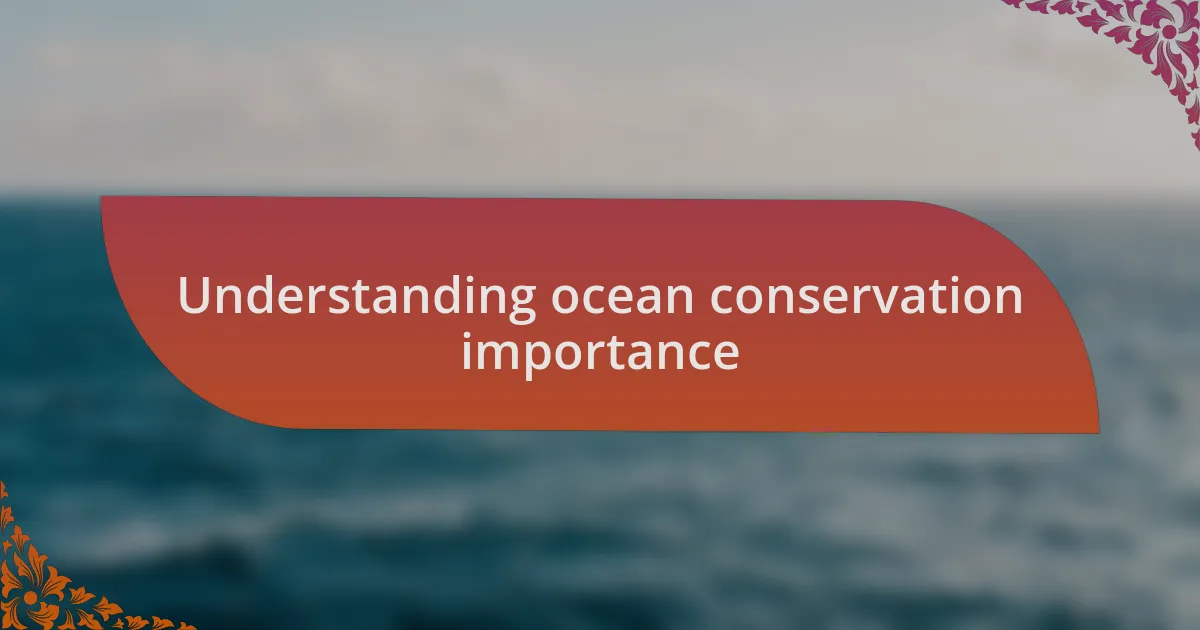
Understanding ocean conservation importance
Our oceans are the lifeblood of the planet, supporting countless forms of life and providing essential resources for human survival. I still remember the awe I felt the first time I swam in a coral reef; the vivid colors and bustling marine life made me realize just how vital these ecosystems are. When we neglect ocean conservation, we risk losing these wonders forever.
I often think about how our actions on land ripple into the ocean. Imagine throwing a plastic bottle into a river; it may seem insignificant, but that bottle can journey far and wide, harming marine wildlife along the way. It’s heartbreaking to witness firsthand the consequences of pollution, such as seeing sea turtles struggle with plastic ingestion, a stark reminder of the urgent need for conservation efforts.
Furthermore, oceans play a significant role in regulating our climate, absorbing carbon dioxide and generating a substantial percentage of the oxygen we breathe. Have we considered what might happen if we continue to ignore their plight? When I dive into this topic, I can’t help but feel a deep sense of responsibility—if we truly want to protect our planet for future generations, we must prioritize ocean conservation now.
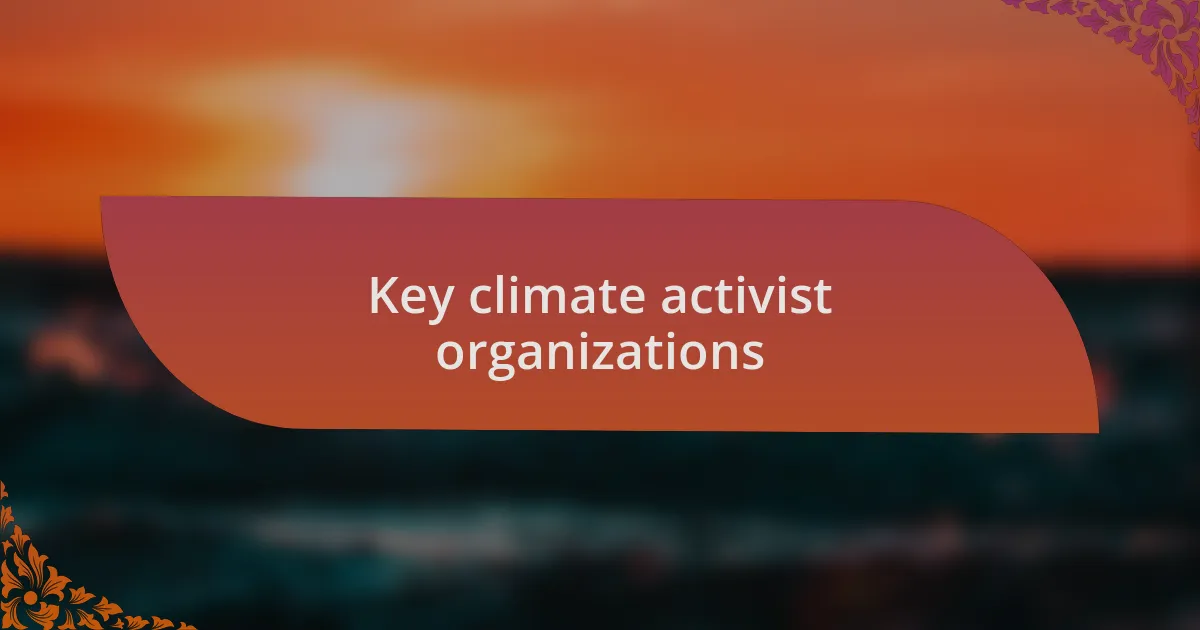
Key climate activist organizations
Key climate activist organizations play a crucial role in mobilizing public awareness and action around environmental issues, including ocean health. One of the most recognized groups is Greenpeace, known for its direct action campaigns and advocacy. I recall attending a local event where a passionate speaker highlighted their efforts to stop destructive fishing practices; it was eye-opening to see how one organization can drive massive change on such a global scale.
Another significant player is the Sierra Club, which combines grassroots activism with political advocacy. Their focus on protecting natural spaces has inspired many to take a stand for our oceans as well. I remember participating in a beach cleanup organized by them; the camaraderie among volunteers was contagious, and it deepened my commitment to the cause. Who wouldn’t feel motivated after spending a day with others who share the same vision?
Lastly, the Ocean Conservancy is dedicated specifically to marine conservation, advocating for policies that protect our oceans. Their annual coast beach cleanup events resonate deeply with me, as I’ve witnessed firsthand the sheer amount of trash littering our shores. It begs the question: if we all put in just a few hours a year, what kind of impact could we collectively make? I believe that engaging with these organizations not only amplifies our voices but also strengthens our connection to the ocean.
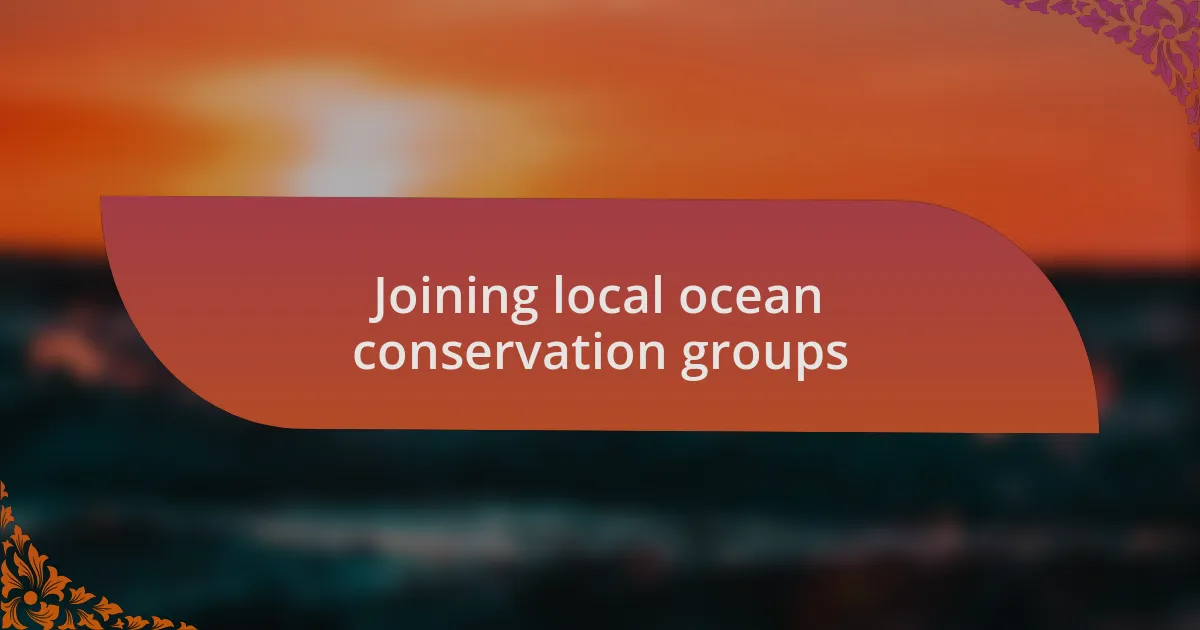
Joining local ocean conservation groups
Joining local ocean conservation groups can be a transformative experience. When I became involved with my local group, I was surprised by how many like-minded individuals were committed to the same cause. I remember my first meeting; the enthusiasm in the room was palpable, and it felt invigorating to share ideas and strategies for protecting our oceans together. Have you ever felt that surge of motivation when surrounded by passionate people? I can assure you, it’s contagious.
These groups not only organize hands-on activities, like beach cleanups and educational workshops, but they also create a sense of community. I once participated in a tide pool exploration event with a local group, and I was amazed at how delighted families were to learn more about marine life right in their own backyards. Engaging with others made me realize that conservation isn’t just about preserving nature; it’s also about building connections and fostering love for our oceans.
Furthermore, being part of these groups offers opportunities to influence local policies and advocate for sustainable practices. When we collaborate, our voices carry weight. I recall rallying together for a local ordinance to reduce plastic waste, and seeing our efforts lead to change was immensely rewarding. It makes me wonder—what impact could we all create if we joined forces and took small, consistent actions for our oceans?
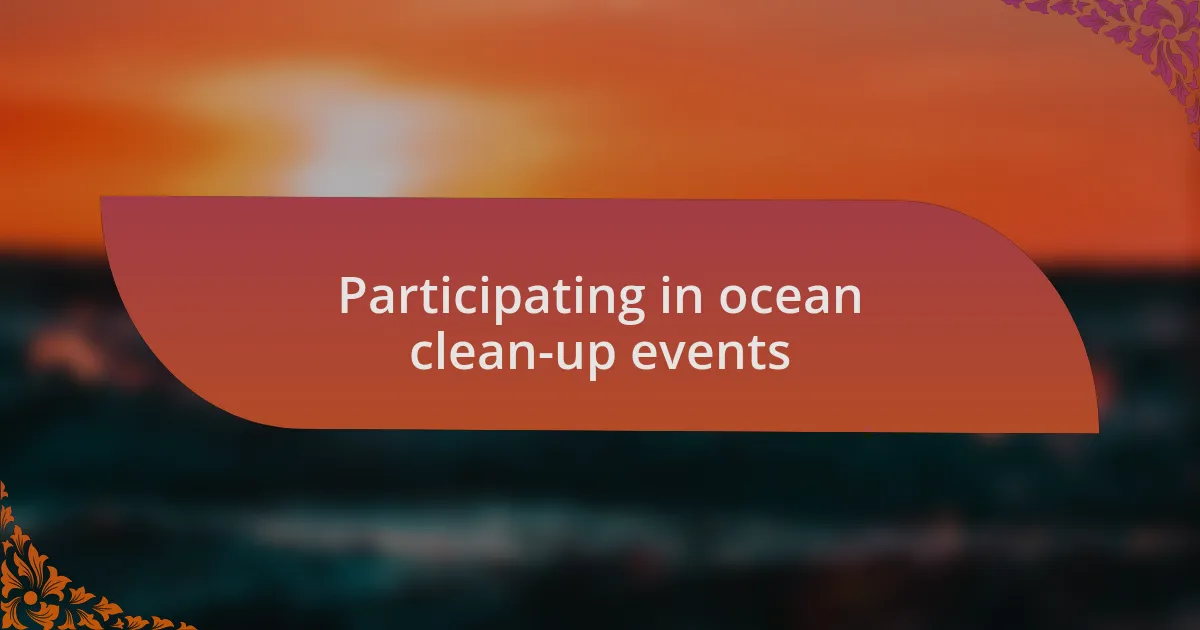
Participating in ocean clean-up events
Participating in ocean clean-up events has been a cornerstone of my journey in ocean conservation. I remember my first cleanup; it felt surreal to see pristine beaches transform into cluttered landscapes littered with plastic. As I picked up trash alongside others, our laughter and camaraderie made the hard work feel lighter. Have you ever felt the satisfaction of collecting litter and knowing you’re directly contributing to a healthier environment? It’s genuinely uplifting.
I’ve also experienced the bittersweet reality of these events. While it’s inspiring to see so many dedicated volunteers, it’s troubling to witness the sheer volume of waste that accumulates in our oceans. I once filled three bags with debris in just an hour. Each piece of trash I picked up connected me to the larger issue: how our habits shape the ocean’s health. This contrast is a powerful reminder of the urgent need for collective action—what’s it going to take for us to turn the tide?
Moreover, clean-up events are not just about removing waste; they’re a chance to raise awareness and educate those around us. During one such event, I spoke with a young volunteer who was shocked at how much plastic was washing ashore. Her curiosity sparked a discussion about alternatives to single-use plastics, and I felt hopeful knowing that by sharing knowledge, we can inspire change. Isn’t it rewarding to engage others in meaningful conversations and drive home the importance of protecting our oceans together?
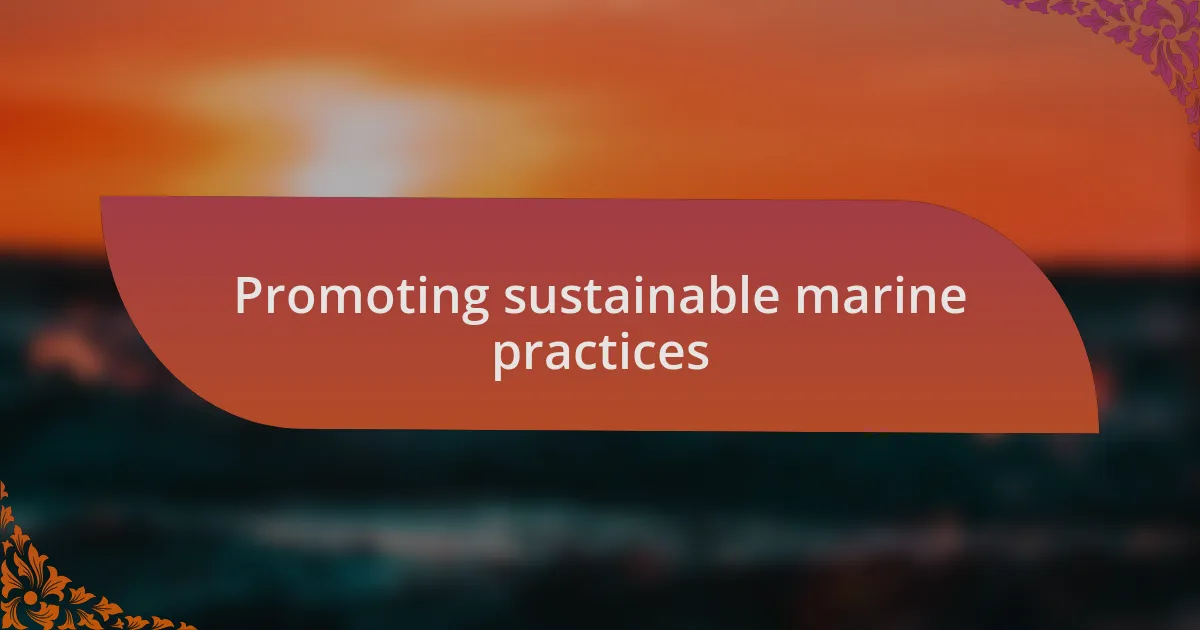
Promoting sustainable marine practices
Promoting sustainable marine practices requires a shift in our everyday habits. I remember switching to reef-safe sunscreen after learning about the harmful effects of certain chemicals on coral reefs during a workshop. It was a simple change, but I felt an immediate sense of responsibility—how many people might be unknowingly contributing to coral decline? This realization sparked conversations with friends about making mindful choices, proving that individual actions can create ripples of change.
In my journey, I’ve embraced sustainable fishing practices as a way to support marine ecosystems. I once went on a fishing trip with friends, and we followed local guidelines about size limits and catch quotas. The thrill of hooking a fish was exhilarating, but the greater excitement came from knowing we were protecting future fish populations. I often wonder, what if more anglers adopted similar practices? This small commitment can lead to a healthier ocean and ensure that marine life thrives for generations to come.
Engaging in community initiatives plays a crucial role in promoting sustainable marine practices. I once attended a lecture where local fishermen shared their experiences with overfishing and the resurgence of certain species when sustainable practices were adopted. Hearing their stories was enlightening and made me feel connected to the ocean’s narrative. Have you ever had the urge to support local businesses that prioritize eco-friendly practices? When we back those who care for the ocean, we all benefit from healthier waters and thriving marine life.
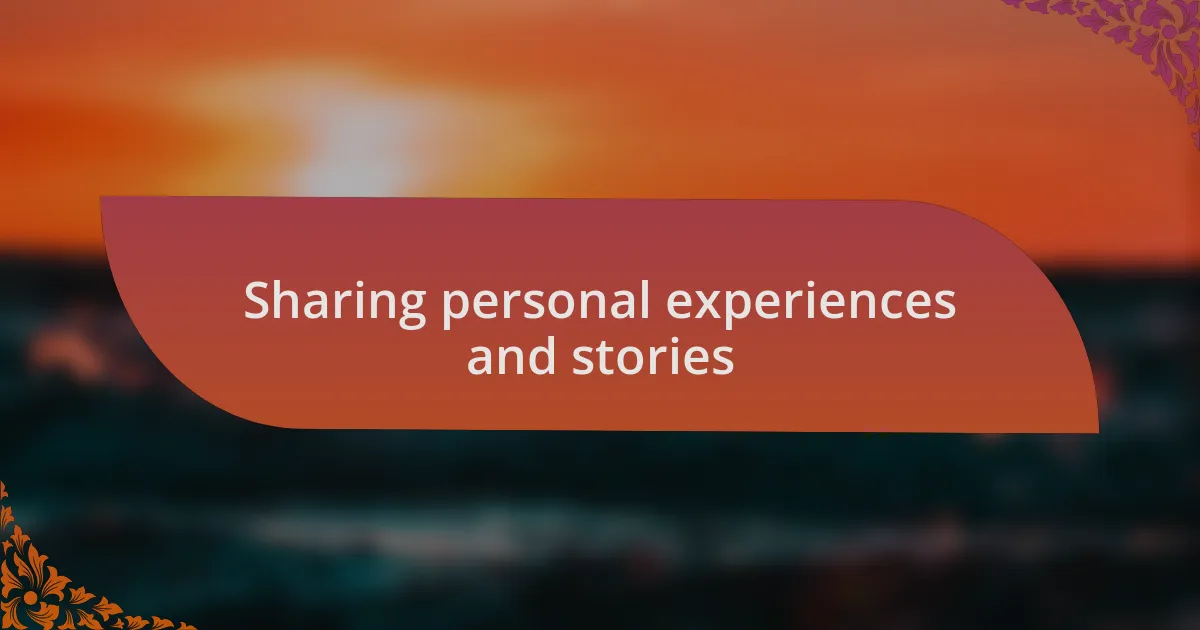
Sharing personal experiences and stories
Sharing personal stories can be a powerful way to connect with climate activists. I remember attending a beach cleanup where I met a group of passionate individuals. One woman shared how her childhood memories of vibrant coral reefs were fading, and it struck a chord within me. It made me think about the generational impact of our actions—what legacy are we leaving for future ocean lovers?
I once decided to share my own experience of witnessing plastic pollution firsthand. While kayaking in a local cove, I was heartbroken to see bags and bottles scattered among the beautiful marine life. That day, I learned that sharing such visceral experiences can inspire others to act. Have you felt that jolt of urgency when confronted with the reality of ocean health? For me, it’s clear: our stories can bridge the gap between awareness and action.
Connecting through stories can evoke a deeper understanding of the climate crisis. I recall a conversation with a close friend who recounted her family’s history of fishing in the same waters. Her sadness over the changing landscape was palpable, and it made me reflect on how collective memory shapes our perspective on conservation. Do you have a story that illustrates the ocean’s journey? We all have unique experiences that, when shared, can illuminate our shared responsibility for marine conservation.